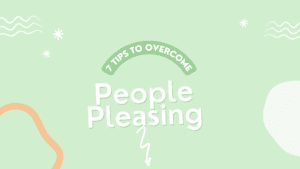What is people pleasing?
We most likely all know someone who could be considered a people pleaser. Our family, friends, co-workers or neighbours may be people pleasers. Perhaps we’re even a people pleaser ourselves. People pleasers put other people’s needs before their own. They drop everything to help someone else even if they don’t like what they’re asked to do. People pleasers have a difficult time with boundaries and saying no. Others often see people pleasers as helpful and kind. However, people pleasers find it difficult to assert their own needs which can lead them to feeling resentful, overwhelmed or neglecting themselves.
Where does people pleasing come from?
Often there’s not one single cause of people pleasing, instead it tends to develop from a number of factors. People pleasing can begin in our childhood. When we have parents who put other people before themselves we might learn to behave this way ourselves. Or perhaps we felt we had to please our parents to be accepted in our family and then carry this pattern into adulthood without questioning it.
People pleasing is also often related to low self esteem and seeking external validation. When we don’t have confidence in ourselves we often seek to keep others happy as a way to feel good about who we are. People pleasing can also result from a fear of rejection so we try to make the relationship as good as possible for the other person. It can also come from previous traumatic experiences such as abuse in our childhood that makes it difficult to know how to set boundaries with others.
Is it bad to be a people pleaser?
There’s no need to feel guilty about being a people pleaser. We all feel good about ourselves when we’ve made someone else happy. There are some positives to being a people pleaser too. People pleasers are often empathic and good at caring for those around them. Being a caring person is an important part of maintaining strong relationships with others.
People pleasing can become an issue for us however when we start to neglect our own well-being and focus exclusively on how other people feel. When we find ourselves doing this we can become angry and resentful that our own needs aren’t being met. We can start to feel overwhelmed and stressed as we overstretch ourselves trying to support others. Sometimes trying to please others leads us to feeling that we don’t know ourselves or that we’re not living our lives in an authentic way.
Can I still be a nice person if I don’t people please?
Whilst pleasing other people might seem like a kind thing to do, it’s not the same as being a nice person. Part of being a nice person is often helping other people but it’s also important that we support ourselves. When we stop people pleasing we often feel less stressed, we have more time for ourselves, and we find we’re happier. Feeling better ourselves frees up our emotional resources so we’re more able to support others when they really need it. People pleasing less is a win-win situation.
A helpful analogy is the in-flight announcement ‘in the event of the loss of cabin pressure, please secure your own mask before assisting others’. The reason we’re asked to do this is because we can’t help someone else if our own needs aren’t met. This goes for people pleasing too. If we neglect our own well-being we’ll be less able to support others. We’re all responsible for our own happiness and people pleasing less means we’re happier so it’s easier for us to be there for others too.
How do I know if I’m a people pleaser?
If you can answer yes to some or most of these questions then the chances are you’re a people pleaser: Do you find yourself worrying a lot about what others might think of you? Is it common for you to struggle to say no or feel guilty if you do? Do you find yourself agreeing to things that you don’t really think? Might you offer to do things you don’t want to do?
Further questions to ask yourself include:
- Do you feel people don’t like you for who you really are or don’t know the real you?
- Is it typical of you to apologise or take the blame?
- Do you feel stressed and overwhelmed, doing things for others whilst neglecting yourself?
- Do your friends or partner get frustrated with you and feel that you share yourself too thinly?
If you are a people pleaser then don’t worry, it’s very possible to overcome it and start to focus on your own happiness instead.

How can I stop people pleasing?
Here are seven simple steps to help you people please less and focus more on your own well-being:
1. Keep a journal
Becoming aware of our behaviours is the first step to changing them. Make a note of how much time you spend pleasing people versus how much time you spend doing the things you want to do.
2. Understand your motivations
When you notice yourself putting someone else first ask yourself why you’re doing this. If you’re doing it because you want to then this might be OK. But if you’re doing it to be liked or because you struggle to say no then it might help to rethink your behaviour.
3. Start setting boundaries
Be clear about how much you can take on for other people. At work, be specific about what you’ll be responsible for. At home share out responsibility. If there’s an event then organise a couple of aspects but allow other people to have a role too.
4. Practice saying no
If you’re asked to do something take time to decide if it suits you. There’s usually no need to respond straight away. When something doesn’t work for you say so directly, there’s no need to make excuses. People will still like you.
5. Let people ask
If you find you constantly volunteer solutions, try not to jump in with offers of support. Instead, listen to the other person but wait until they ask you to help. It might be that all they want is to feel heard.
6. Consider your happiness
It’s not your role to keep people happy. Everyone being happy all the time is impossible and it’s an unrealistic goal to set yourself. Start to focus on your own happiness and let other people begin to take responsibility for theirs.
7. Take small steps
People pleasing is often a long term habit so we can’t always change it all at once. Start by taking small steps towards people pleasing less. For example, start by saying no to small requests and build things up from there.
How can Online-Therapy.com help?
If you’ve identified yourself as a people pleaser and are struggling to overcome it then Online-Therapy.com can help! By signing up to our program you will choose a therapist who will work with you to explore your people pleasing in more depth and help you find solutions.
At Online-Therapy.com we offer an integrated and holistic package to support your well-being. Our approach includes regular sessions with your chosen therapist, unlimited messaging and worksheet support, journaling and yoga. The ongoing support we provide means that you have the daily expert guidance you need to make progress and overcome people pleasing for good.




Leave A Comment